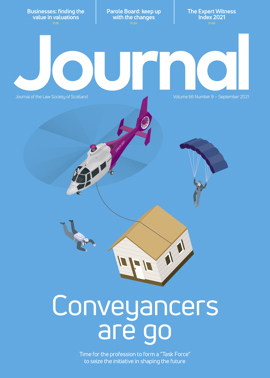President's column
Before opening my office in November 1992, I attended a meeting with my accountants to uplift the ledger books and ring binders that I would need to complete (“on a daily basis if you want to avoid trouble”), to keep on top of firm finances and comply with the accounts rules. Just thinking about the practice and discipline of double entry bookkeeping still makes my head hurt.
As the office became busier, my mother was volunteered to take over the cashroom. At age 92 she is still supervising the books that are now handled by the same accountants from whom I collected the ledgers almost 30 years ago. My father, a retired teacher, also works with me. As a filing clerk/messenger, before lockdown, he would come into the office to take pressure off the secretaries every afternoon and then he would archive the dead files at home. He would bring my mum up on a Thursday to catch up with the finances. COVID put an end to the weekday office attendances. Even now that COVID restrictions have eased, as much as a measure to keep them safe as anything, they only come in on Saturdays when there’s no one else in the office. It has been emotionally priceless to have family support with my business, and I am sure that I haven’t told my parents that enough.
The advice to a police officer for the day after their retirement has always been to “put on your shoes and not your slippers or you’ll be dead in a year”. I have no doubt that the mental and physical engagement that my parents have given to my business has kept them alive. But now my parents are feeling their age and they want to retire.
Growing imbalance
Retiring (again) when in your 90s is great, but I really hope that most of us are able to step away from a full time working life long before that age is reached. The private practice business model has always been the most efficient when it comes to delivering legal aid services – at least from a Government cost perspective – but just how easy it is to make proper pension provision from legal aid profits is another matter. As the Crown receives increased funding for its deputes, the attractiveness of the defence bar is further diminished and with that the chances of legacy planning for partners in the criminal court practice area.
It is a good thing that the Government is looking ahead to see that the civil and criminal justice systems are in the best shape possible to get through the backlog of cases and process new business. The Law Society of Scotland is eager to contribute to the thinking on RRT. But before we consider “T”ransforming, there is the issue of “R”ecovering and “R”enewing. There are to be more courts so, therefore, more fiscals and more sheriffs, but what about solicitors? Criminal court pleaders are a finite and diminishing resource – as well as an undervalued one. Until there is further, and long overdue, investment in legal aid that redresses the current imbalance between privately funded and legally aided work, and now also the imbalance between the Crown and the defence, there will inevitably be a problem with supply and demand. It is in the interests of all, not just the legal aid solicitor, that those who would have the justice process operate at its best recognise the need for such investment.
Regulars
Perspectives
Features
Briefings
- Civil court: Legacy of COVID
- Corporate: The enigma of economic duress
- Employment: where will work be found?
- Intellectual property: David v Goliath battle continues
- Agriculture: Crofting disputes: some first principles
- Sport: Arbitration – within the rules?
- Property: ADS: the hidden traps
- In-house: On harm, stakeholders and risk management
In practice
- Ask Ash: Colleague's chat is my privacy
- Lockdown no more
- The Word of Gold: The potency of passion
- Get interactive at the Law and Technology Conference
- Ten red flags for conveyancers
- The Eternal Optimist: So, what do you want to be?
- Commissary: the top 10 failings
- Mobility challenges – and the kindness of strangers
- When all is remote







